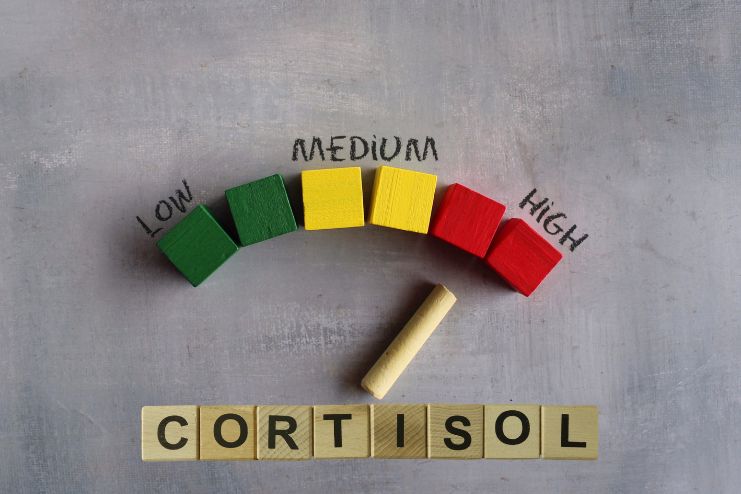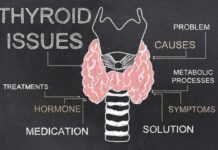Too tired to focus, but too wired to sleep? Your adrenals might be sounding the alarm. That peculiar sensation of being mentally fatigued but physically agitated is commonly known as being “wired but tired.”
Your mind is in shutdown mode, but your body won’t unwind. This may be a symptom of what some call adrenal fatigue — or better still, HPA axis dysregulation, an adrenal-related disorder in which your body’s stress response system is disrupted.
The concept is that after extended periods of physical, emotional, or mental stress, your adrenal glands can no longer keep pace with the body’s need for hormones such as cortisol. This can cause fatigue, sleep issues, low energy, mood swings, and even cravings for salt or sweets. Even though adrenal fatigue is not yet an accepted medical diagnosis by leading health associations such as the Endocrine Society or the Mayo Clinic, numerous functional and integrative medicine clinicians think that it does indicate actual, long-term effects of stress.
If you’re operating on fumes but can’t shut down, perhaps you should heed your body’s warnings.
Read More: Unexplained Fatigue? It Could be a Thyroid Issue
What Is Adrenal Fatigue?

Adrenal fatigue is a collection of symptoms caused by an imbalance in your body’s stress response system, the hypothalamic-pituitary-adrenal (HPA) axis. The HPA axis regulates how your body responds to stress, primarily by regulating the release of cortisol, your main stress hormone.
When stress is prolonged through overwork, sleep deprivation, unresolved trauma, or even too much caffeine, the system can become unbalanced, leading to what’s often called adrenal burnout.
What Causes It?
Ongoing stress keeps your body in a “fight or flight” mode, causing cortisol imbalance and fatigue. Initially, your adrenal glands will pump out too much cortisol, but eventually, they can’t keep up, resulting in lower levels.
This might leave you running empty, spaced out, and disconnected despite an entire night of sleep.
Common Signs of Adrenal Burnout
Some common signs of adrenal burnout include:
- Feeling tired but can’t sleep
- Being dependent on caffeine or sugar to get through the day
- Having cravings for salty foods
- Experiencing brain fog or having trouble concentrating
- Feeling low on motivation or overwhelmed
These signs are usually subtle and will overlap with other diseases, so adrenal fatigue is difficult to diagnose using standard laboratory tests.
How Is It Different from Adrenal Insufficiency?
Unlike adrenal insufficiency (such as Addison’s disease), which is a medically recognized disease with quantifiable deficiencies in hormone production, there is no official acknowledgment of adrenal fatigue by principal health organizations.
Still, some holistic and functional medicine practitioners suspect that it reflects actual symptoms associated with stress.
Treatment for adrenal fatigue sometimes begins with alterations in lifestyle; prioritizing rest, reducing stress, regularizing a balanced diet, and moderating stimulants.
Read More: Grease the Groove: Build Strength without Fatigue
Common Symptoms of Adrenal Fatigue

Adrenal fatigue isn’t yet an officially recognized condition by conventional medicine, but numerous individuals have symptoms that indicate their bodies are experiencing chronic stress.
The condition is thought to be caused by an overburdened stress response system, particularly the adrenal glands, which can cause low cortisol fatigue, a condition where your body is unable to produce sufficient amounts of the stress hormone cortisol.
These are some of the typical signs that can indicate adrenal fatigue:
1. Morning Fatigue Despite Enough Sleep
You feel exhausted when you wake up, even after 7–8 hours of sleep. It’s as if your energy tank remains empty, a typical indication of low cortisol fatigue when your body doesn’t recharge overnight.
2. Energy Dips Mid-Morning or Afternoon
Following a slow beginning, you might experience another crash in energy during mid-morning or mid-afternoon. These crashes can make it difficult to concentrate, remain productive, or even remain awake.
3. Craving Salty or Sugary Snacks
Your body might crave salty chips or sweet snacks as a quick energy boost, usually because of cortisol and electrolyte imbalances associated with adrenal fatigue.
4. “Wired but Tired” at Night
You are tired in the daytime but all of a sudden get filled with energy during the evening time, so it is challenging to unwind and sleep when required.
5. Trouble Sleeping
Sleep is often disrupted. You may find it hard to fall asleep, wake up frequently, or rise feeling tired, further contributing to your fatigue.
6. Brain Fog and Mood Swings
You might feel mentally sluggish, forgetful, anxious, or easily irritated. These symptoms are often tied to hormonal imbalances and ongoing stress.
7. Reliance on Caffeine or Energy Drinks
Requiring several cups of coffee or energy drinks to get going is a sign your body isn’t producing energy independently, yet another warning sign of low cortisol fatigue.
Read More: Adrenal Fatigue Diet that You Need to Know
What Causes the “Wired but Tired” Feeling?

Ever feel totally exhausted but still can’t sleep? You’re not alone. That maddening condition of being “wired but tired” can have you tossing and turning at night and plodding through the day. It usually indicates deeper problems with stress, hormones, and sleep patterns.
Chronic Stress and Cortisol Overload
When you’re under chronic stress—be it emotional, physical, or mental—your body releases lots of cortisol, the primary stress hormone. Initially, this works in your favor.
But after a while, your adrenal glands can get maxed out, causing chronic stress and energy crashes throughout the day.
When the body has trouble keeping up, it can lead to adrenal fatigue, low energy, sleep difficulties, sugar cravings, mood swings, and brain fog. These are all indications that your stress response system is out of sync.
Flipped Cortisol Rhythm: Low in the Morning, High at Night
In a healthy body, cortisol peaks in the morning to help you wake up and gradually decreases as the day goes on. But long-term stress can flip this natural pattern.
Many people with adrenal fatigue experience low cortisol in the morning—making it hard to start the day—and high cortisol at night, keeping them alert when they should be winding down.
This reversed rhythm has something to do with the “wired but tired” feeling, that is, tired in the day and wide awake at bedtime.
Circadian Rhythm and Stress
Your circadian rhythm is your inner body clock that governs sleep, hormone function, and metabolism. When cortisol is out of balance, it disrupts this rhythm, causing your body to find it more difficult to sleep, repair, and recover.
This relationship between the circadian rhythm and stress is one reason that sleep disturbance and fatigue are commonly associated with adrenal problems.
Knowing what’s causing that “wired but tired” sensation is the first step to regaining energy and better sleep.
Read More: Uncover the 11 Hidden Causes Behind Your Fatigue
How to Support Adrenal Recovery Naturally

If you’re feeling perpetually drained, stressed, or emotionally spent, you may wonder how to recover from adrenal fatigue. Restoration usually depends upon a combination of diet, lifestyle changes, and specific assistance.
Expert Advice
Dr. Cindy Jakubiec, a functional medicine practitioner, advises starting with nutrition.
She suggests adhering to an adrenal fatigue diet comprising high-quality protein, healthy fat, leafy greens, magnesium-rich foods, and B-rich foods. “Blood sugar stability is the priority,” she insists, and that begins with balanced meals.
Healthdirect Australia emphasizes lifestyle in adrenal recovery. They recommend avoiding caffeine, improving sleep, and managing stress. As per their guide, “rest, nutrition, and self-care play a central role in recovery.”
Practical Tips for Adrenal Support
- Adopt an Adrenal Fatigue Diet: Include protein, healthy fats, and nutrient-rich vegetables in every meal. Avoid sugar, processed foods, and stimulants.
- Manage Stress: Practice yoga, breathing exercises, or meditation to calm your nervous system.
- Prioritize Sleep: Aim for 7–9 hours of uninterrupted sleep each night.
- Stay Hydrated: Drink water throughout the day to support your energy and metabolism.
- Limit Stimulants: Cut back on coffee and energy drinks that can further stress your adrenals.
- Try Adrenal Support Supplements: Supplements like magnesium, B-complex, vitamin C, and adaptogenic herbs (ashwagandha, Rhodiola) can offer support. Consult a healthcare provider before starting any new supplement.
Taking small, steady steps is the best option while learning how to recover from adrenal fatigue.
Read More: Understanding Circadian Rhythms
When to Seek Medical Help

If you’re exhausted despite how much you sleep or how nutritious your diet is, it’s now time to move beyond self-care. Persistent fatigue, even after following a solid stress recovery routine, may signal more than a simple burnout.
It might be attributed to adrenal dysfunction or some other health condition that should be checked by a doctor.
Recognizing an Adrenal Crisis
Although mild symptoms of adrenal fatigue can be treated with lifestyle modification and burnout recovery strategies, more serious symptoms might indicate an adrenal crisis—an emergency medical condition. Signs, as reported by the Cleveland Clinic, are:
- Severe diarrhea or vomiting
- Low blood pressure or dizziness
- Irregular heartbeat
- Severe abdominal pain
- Confusion or severe weakness
If you have these symptoms, get emergency help immediately.
When Lifestyle Changes Aren’t Enough
If exhaustion persists despite rest, proper nutrition, and adaptogens like ashwagandha or Rhodiola, it’s a good idea to get yourself tested. Medical testing can reveal underlying causes like:
- Cortisol levels (saliva or DUTCH test)
- Thyroid panel
- Iron, B12, and Vitamin D3 deficiencies
These tests assist in determining imbalances that may be causing your energy crash.
Work With the Right Practitioner
Consider seeing a functional medicine doctor or a holistic practitioner who understands the nuances of adrenal health. According to Caritas Hospital, professional guidance can help you develop a treatment plan that addresses both symptoms and root causes effectively.
Taking action when symptoms persist is part of a smart, long-term burnout recovery strategy, especially when your own efforts are no longer working. Prioritize your health and partner with a professional to regain your energy and balance.
Read More: 15 Ways to Boost Metabolism
Conclusion

Being “wired but tired” all the time is not something you want to brush off; it is your body signaling that it needs rest, not additional caffeine or grinding through. This feeling of exhaustion can be associated with stress-related hormonal imbalances, which are commonly known as adrenal fatigue.
Although conventional medicine doesn’t officially diagnose adrenal fatigue, functional health practitioners alike concur that stress over time, insomnia, and burnout can interfere with your body’s cortisol rhythms and natural energy pathway.
The better news is that your body can heal. By adopting some easy lifestyle adjustments—such as consuming well-balanced meals, sleeping well, and keeping stress at bay.
You don’t need to go harder or dig deeper for motivation. As one professional smartly suggests, “You don’t need more motivation—you need more recovery. Start there.”
References
- https://www.sciencedirect.com/science/article/abs/pii/S2212962614000054
- https://www.endocrine.org/patient-engagement/endocrine-library/adrenal-fatigue
- https://www.mayoclinic.org/diseases-conditions/addisons-disease/expert-answers/adrenal-fatigue/faq-20057906
- https://health.clevelandclinic.org/the-truth-about-adrenal-fatigue
- https://www.niddk.nih.gov/health-information/endocrine-diseases/adrenal-insufficiency-addisons-disease/symptoms-causes
- https://www.niddk.nih.gov/health-information/endocrine-diseases/adrenal-insufficiency-addisons-disease/symptoms-causes
- https://www.webmd.com/a-to-z-guides/adrenal-fatigue-is-it-real
- https://vitalitytulsa.com/functional-medicine-guide-to-adrenal-fatigue/
- https://www.health.harvard.edu/blog/is-adrenal-fatigue-real-2018022813344
- https://www.calm.com/blog/tired-but-wired
- https://holtorfmed.com/articles/feeling-wired-but-tired-you-may-have-adrenal-fatigue/
- https://www.hopkinsmedicine.org/health/conditions-and-diseases/chronic-fatigue-syndrome
- https://www.healthdirect.gov.au/adrenal-fatigue
- https://thesolutioniv.com/blog/fight-adrenal-fatigue/
- https://drcindyjakubiec.com/adrenal-fatigue-diet-the-best-foods-to-nourish-your-adrenals/
- https://my.clevelandclinic.org/health/diseases/23948-adrenal-crisis
- https://www.amenclinics.com/blog/11-signs-of-adrenal-fatigue-stress-related-adrenal-exhaustion/
- https://www.caritashospital.org/article/adrenal-fatigue-separating-fact-from-fiction
In this Article





















